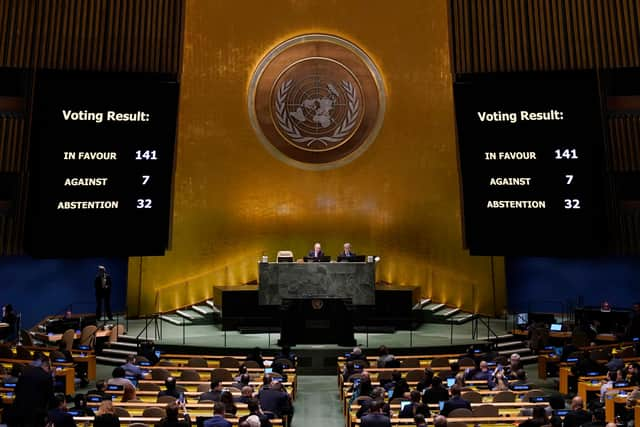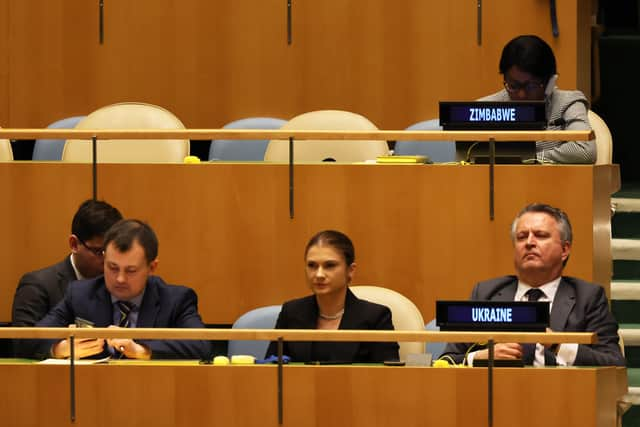UN General Assembly vote: who voted against UN resolution on Ukraine, did Russia vote - results and list
and live on Freeview channel 276
On the eve of the first anniversary of Russia’s full-scale invasion of Ukraine, the UN General Assembly approved a non-binding resolution that demands Moscow withdraw its forces, and calls for an end to hostilities, sending a clear message that Russian aggression must end.
The General Assembly has become the most important UN body dealing with Ukraine because the Security Council, which is charged with maintaining international peace and security, is paralysed by Russia’s veto power. Its resolutions are not legally binding, unlike Security Council resolutions, but serve as a barometer of world opinion.
Advertisement
Hide AdAdvertisement
Hide AdForeign ministers and diplomats from more than 75 countries addressed the assembly during two days of debate, with many urging support for the resolution that upholds Ukraine’s territorial integrity, a basic principle of the UN Charter that all countries must subscribe to when they join the world organisation.
The resolution, drafted by Ukraine in consultation with its allies, passed 141-7, with 32 abstentions. But which countries abstained from the vote, and which actively sided against it? Here is everything you need to know.
What does the resolution mean?


Contrary to Security Council resolutions, the General Assembly’s decisions are advisory only and act as a gauge of global sentiment. Ukrainian foreign minister Dmytro Kuleba said it was more evidence that it is not only the West that backs his country.
“The support is much broader, and it will only continue to be consolidated and to be solidified,” Kuleba said after the vote. “This vote defies the argument that the global south does not stand on Ukraine’s side because many countries representing Latin America, Africa (and) Asia voted in favour today.”
Advertisement
Hide AdAdvertisement
Hide AdIn his own appeal, Polish foreign minister Zbigniew Rau said Ukrainians deserve “not only our compassion, but also our support and solidarity,” while Germany’s foreign minister Annalena Baerbock asked countries that claim “that by arming Ukraine, we are pouring oil into the fire” why Western nations would do that.
“The West didn’t want or choose the war and would rather focus all its energy and money on fixing schools, fighting the climate crisis or strengthening social justice,” she told the assembly. “But the truth is – if Russia stops fighting, this war ends. If Ukraine stops fighting, Ukraine ends.”
Which countries abstained?


32 countries abstained from the vote, not lending their support to either side in a hope to stay “neutral” in the conflict. The list includes China, arguably the biggest global player that has declined to offer a clear stance on the war - and in recent weeks has been rumoured to be considering supplying Russia with arms.
Other “big” names to abstain include India, which has had long-standing ties with Russia and relies heavily on it for its weaponry. Since the invasion, it has increased its trade with Russia, particularly its imports of crude oil, to all-time highs.
- Algeria
- Angola
- Armenia
- Bangladesh
- Bolivia
- Burundi
- Central African Republic
- China
- Congo
- Cuba
- El Salvador
- Ethiopia
- Gabon
- Guinea
- India
- Iran
- Kazakhstan
- Kyrgyzstan
- Laos
- Mongolia
- Mozambique
- Namibia
- Pakistan
- South Africa
- Sri Lanka
- Sudan
- Tajikistan
- Togo
- Uganda
- Uzbekistan
- Vietnam
- Zimbabwe
Which countries voted against the resolution?
Advertisement
Hide AdAdvertisement
Hide AdThere were seven countries which actively voted against the resolution. Unsurprisingly, Russia was one of them. Belarus, a strong ally of Putin that has allowed passage of Russian military and equipment en route to Ukraine was another.
Mali changed its stance and voted against this week’s resolution, coming out in support of Russia after having twice abstained from voting on U.N. resolutions on Ukraine. In an effort to increase its global influence, Russia has provided its government with renewed military assistance.
Nicaragua and Russia have maintained a security alliance in recent years, with ties between the two going back to the Cold War.
- Belarus
- North Korea
- Eritrea
- Mali
- Nicaragua
- Russia
- Syria
Comment Guidelines
National World encourages reader discussion on our stories. User feedback, insights and back-and-forth exchanges add a rich layer of context to reporting. Please review our Community Guidelines before commenting.
